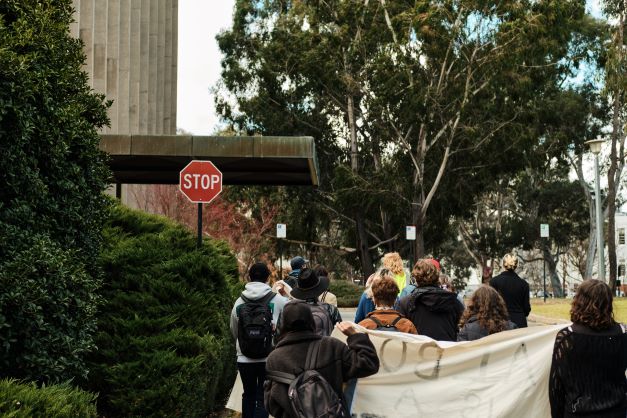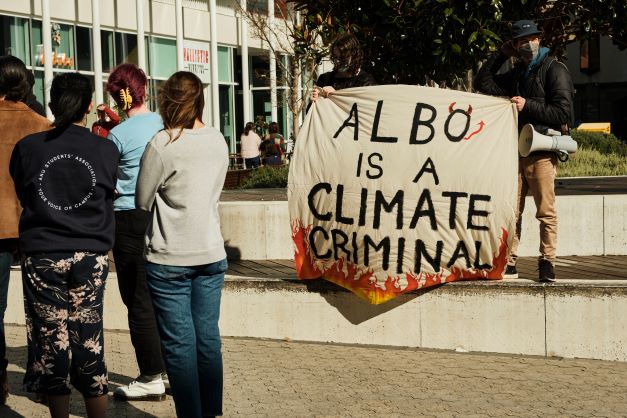On Friday 5 August, left-leaning and environmentalist student bodies hosted a protest against the new Labor Government’s climate policies in Kambri.
The demonstration was coordinated with other protests on university campuses across the country as part of the National Union of Students’ (NUS) week of action for climate justice. This was the latest in a long tradition of pro-climate-action student demonstrations, but the first addressing the Albanese government’s approach to addressing the climate crisis.
The protest drew nearly 50 attendees and many others who turned their heads as they walked through Kambri. The main target of the event’s speakers was Labor’s emissions reduction goal of 43 percent by 2030.
Yerin Parks, speaking for Socialist Alternative, decried the targets as “utterly inadequate” and a “greenwashing of the fact that [the current government] will open coal mines [and] gas and oil projects”.
ANU Labor Left member Azraa Hussain bluntly echoed the sentiment stating “43 percent is not fucking enough.”
The various organising bodies settled on a four-point platform on which to run the protest:
- No new fossil fuel projects,
- 100 percent public renewables by 2030,
- An immediate, just transition for workers,
- Land rights, not mining rights.
Other common themes were the role of trade unions in the fight for climate action, the projected increase in Australia’s fossil fuel exports, and the ANU’s non-disclosure of investments.
An ANU spokesperson said that “the University is committed to its [Socially Responsible Investment] policy”, and that the domestic portfolio holds “32 percent less carbon intensity” than the aggregate of the 200 largest Australian companies. The spokesperson also noted the recent commitment to “75 percent less carbon intensity than the MSCI All Country World ex Australia Index” in international investment.
After the speeches, about half the crowd was led in a short march to the chancellery. Many of the protesters carried signs bearing all too familiar slogans like “No Planet B” along with the more topical, such as “Albo is a Climate Criminal.”

Once there, NUS Representative Grace Hill, lambasted the ANU’s connections with the Australian Defence Force and its “disgusting relationships” with fossil fuel companies.
Freya Brown, ANUSA’s Environmental Collective Officer, who attended the rally, echoed the sentiments of the protest:
“…the last time [the ANU] did disclose its investments, it was in Santos, Rio Tinto, and other fossil fuel companies. So, we’re demanding the ANU discloses its investments… and completely 100 percent divests from fossil fuel[s].”
Brown was positive, though, on the effects of student protests like the 5 August demonstration, arguing “there is great value in protesting for climate action no matter what the size” and that “it’s really important that we continue to show up for climate action and keep momentum going despite Labor being in.
We acknowledge the Ngunnawal and Ngambri people, who are the Traditional Custodians of the land on which Woroni, Woroni Radio and Woroni TV are created, edited, published, printed and distributed. We pay our respects to Elders past and present. We acknowledge that the name Woroni was taken from the Wadi Wadi Nation without permission, and we are striving to do better for future reconciliation.
